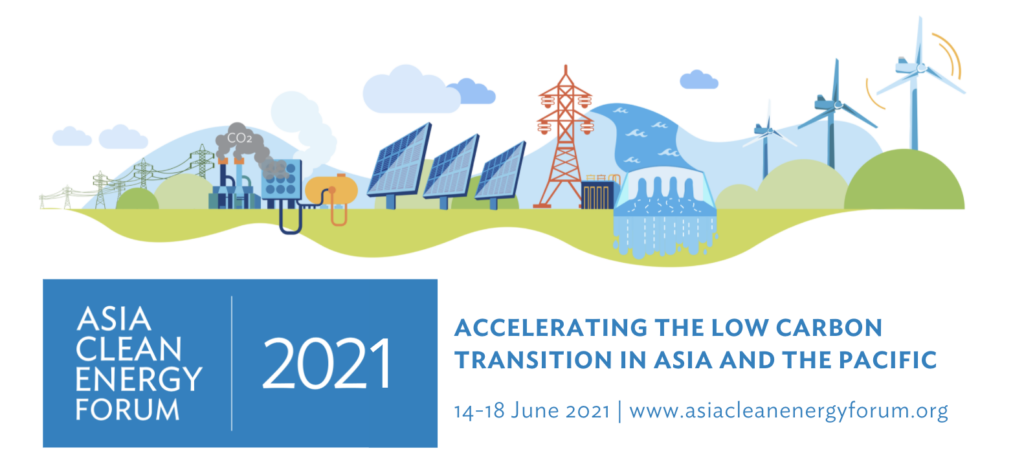(Now Closed)
ACEF 2021’s Main Theme and Objectives
The theme of the Asia Clean Energy Forum (ACEF) 2021 is Accelerating the Low Carbon Transition in Asia and the Pacific. ACEF 2021 is organized based on 3 main pillars:
-
1. technology roadmaps to achieve Nationally Determined Contributions (NDCs);
2. rebounding from COVID-19 and prospects for a green recovery; and
3. consultations to make the ADB Energy Policy more relevant.
ACEF 2021 aims to:
- align ADB’s efforts in clean energy and climate mitigation and adaptation toward its member countries’ achievement of their climate targets and Asia and the Pacific’s fulfillment of the climate goals—particularly, the UN’s Sustainable Development Goals 7 and 13 (SDG 7, SDG 13), and the Paris Climate Agreement;
- assess the multi-sectoral impact of COVID-19 on the ability to achieve ADB’s Strategy 2030 and the 2030 SDG goals of ensuring access to affordable, reliable, sustainable, and modern energy for all (SDG 7), and taking action to combat climate change and its impacts (SDG 13); and
- discuss technologies, issues, and strategies on accelerating the low-carbon transition in Asia and the Pacific during and after the COVID-19 pandemic.
Thematic Tracks at ACEF 2021
The Thematic Tracks at ACEF provide space for detailed discussions on various sub-sectors and topics of interest in the transition to a low-carbon energy system. Each track is curated by an ADB staff to reflect areas of concern and interest in ADB’s work with its developing member countries (DMCs), and with the energy sector more broadly.
There will be two thematic tracks at ACEF 2021:
Track 1 will consider long-term issues faced by ADB’s DMCs. The ability to balance economic growth, poverty reduction, and tackle climate change—known as the Energy Trilemma—will require innovative technologies and business models. To better equip the DMCs in achieving their NDC targets, the Track will explore issues and strategies for confronting the energy transition. Discussion topics will include energy sufficiency, flexibility, and reliability to meet development goals; energy access; climate issues and resiliency; financing such as transition finance and green bonds; and strategies for private sector intervention.
Potential topics in Track 1 include:
- Future pathways and technology roadmaps (emergent technologies, transition fuels)
- Balancing economic goals with the low-carbon transition (cross-sectoral issues)
- Transition financing: innovative models for clean energy transition
Track 2 will consider medium-term issues faced by ADB’s DMCs. The pandemic disruption has provided a window of opportunity to reset energy sector priorities and to rethink technology, finance, and policy in light of cross-sectoral issues and needs. While technological innovations and markets have to be assessed under the new normal scenario, new priorities must consider the urgency of accelerating the transition to a low-carbon energy system. The climate agenda will have to be mainstreamed into energy strategies. New policies, financing, and business models will have to be adapted.
Potential topics in Track 2 include:
- Resetting energy sector priorities (e.g., energy access, energy efficiency and supply-side management)
- Mainstreaming the climate agenda in energy strategies and adapting new business models
- Restructuring policy and financing support (e.g., green bonds, blue bonds, etc.)
Special Topics for Spotlight and Regional Sessions
Aside from the Track Sessions, ACEF 2021 will also feature Spotlight Sessions and Special Sessions on Regional Topics.
- Spotlight Sessions are sessions covering innovative ideas and approaches in clean energy.
- Special Sessions on Regional Topics are sessions organized by ADB’s Regional Departments. They cover projects being planned and/or implemented, as well as new and emerging issues that may be addressed by ADB in its regional operations.
Topics to be discussed in these sessions will be determined and designed based on proposals from ADB’s Operating Departments, as well as proposals received through this Call for Abstracts process.
Guidance for Development of Abstracts
The ACEF program is developed based on submission of abstracts targeted at specific clean energy topics, organized into streams (the Thematic Tracks), Spotlight Sessions, and Special Sessions on Regional Topics. Submissions should be based on successful (or in some cases unsuccessful!) experiences in the design, implementation, and/or evaluation of projects, programs, initiatives, and business models.
Broadly speaking, we prefer abstracts that are more practical than theoretical, and that cover innovations in technology and energy systems. Abstracts should fit into the two Thematic Tracks, while also addressing the 7 Operational Priorities in ADB’s Strategy 2030. As noted above, we may also consider abstracts for inclusion in the other sessions being organized during ACEF—Spotlight Sessions, and Special Sessions on Regional Topics—although we cannot yet provide details on the topics of all of these sessions at this time.
Abstracts can cover new and proven approaches to policy development through both private and public sector collaboration; investment and financing opportunities that help drive the market; community and grassroots initiatives; creative business models and approaches that are gaining traction in Asia; and detailed case studies of best practices and lessons learned throughout the energy and related sectors in Asia.
The deadline for submission of abstracts is Friday 16 April 2021. Submissions must be short (no more than 150 words). For more information about ACEF, you can sign up to receive updates from our newsletter or follow us on Twitter, LinkedIn, and on Facebook. If you have any questions, you may contact us at acef@adb.org.




You must be logged in to post a comment.